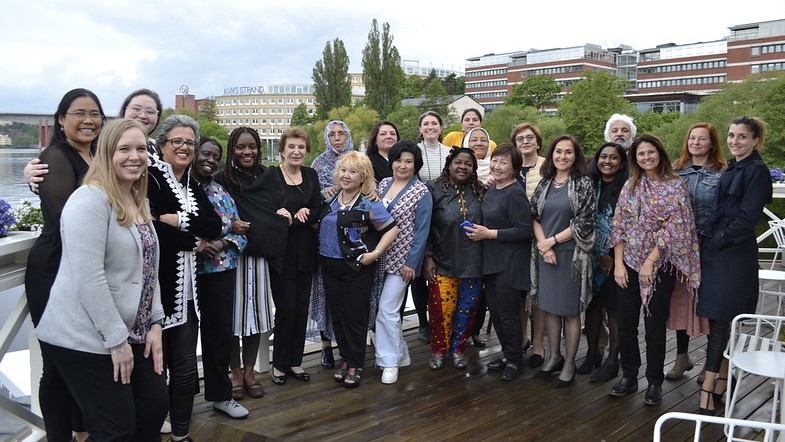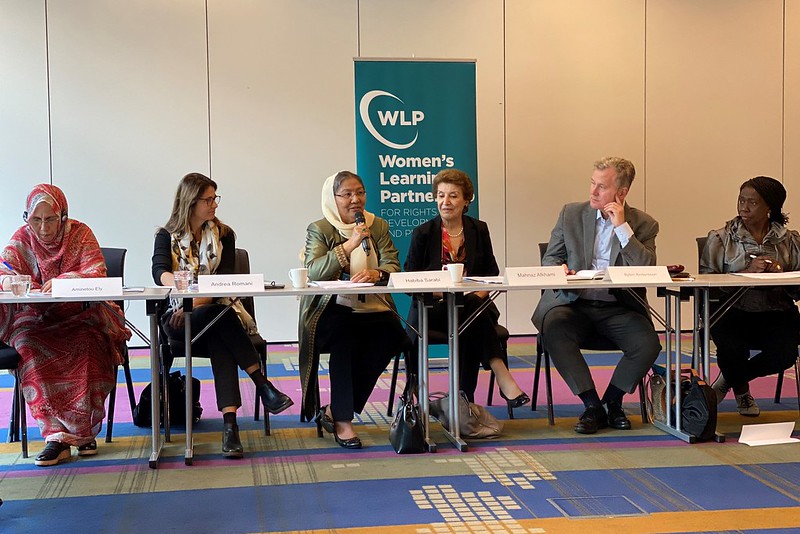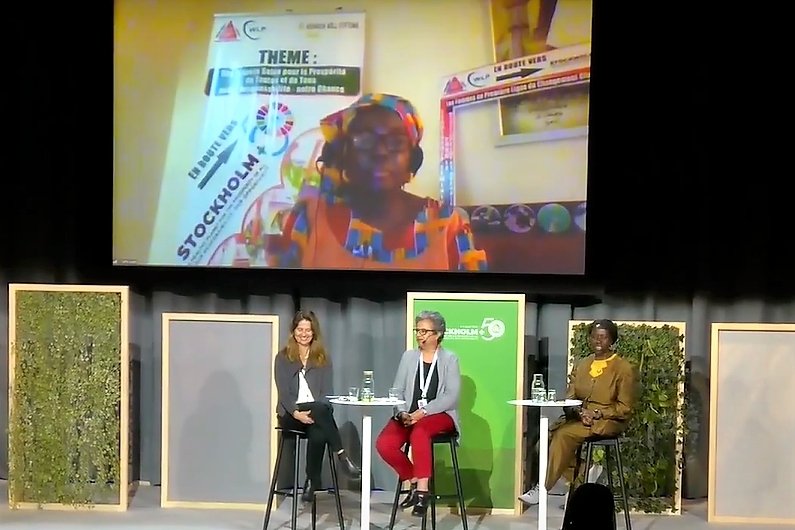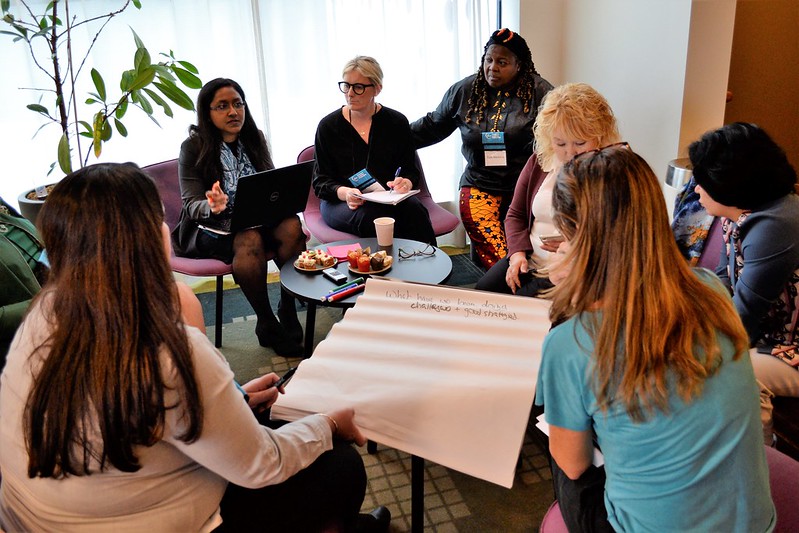
WLP partners, guests, and staff convene in Stockholm, Sweden.
Meeting May 30-31 in Sweden, 40 allies, partners, and board members of Women’s Learning Partnership (WLP) from around the world shared their knowledge and experience addressing threats to rights, democracy, and the environment. Among them were senior officials from international agencies, political leaders, heads of organizations, and renowned scholars.
Once a year, WLP hosts its Transnational Partners Convening (TPC) to share updates on women’s rights campaigns and to set the Partnership’s next priorities. This year’s convening took place in Stockholm to coincide with the UN’s high-level Stockholm+50 Forum, an international meeting focused on measures to slow climate change and protect the environment. Representatives of WLP participated on Forum panels, drawing attention to the interconnected challenges of climate justice and women’s equality.

WLP partners and guests from Nigeria, Kazakhstan, Kyrgyzstan, Iran, Mozambique, and Brazil hold new translations of the WLP manual Beyond Equality in Russian and Portuguese.
At the convening, WLP partners from across the Global South, gave presentations on conditions in their countries, and their latest work to address the effects of the climate crisis on vulnerable populations. Participants described how the pandemic has exacerbated threats to democracy and the future for women’s rights globally. Several participants described the enormous toll that the constant threat of violence and ongoing conflict has taken on the communities with whom they work. Refugees were recognized as an underutilized resource for knowledge and ideas for solving in-country challenges. “We need cross-cultural collaboration, whether it is the wars that are going on, the pandemic, or the destruction of our climate, this is an existential moment in history that needs every one of our efforts, every one of our thoughts, every one of our discoveries, and working together to be able to bring change,” said WLP President Mahnaz Afkhami at the opening of the meeting.
In addition to learning from each other’s experiences and best practices, participants strengthened their connections and planned joint projects. As the gathering drew to a conclusion, many WLP partners shared that they felt increased solidarity and support.
In our discussions, several themes emerged relating to supporting and sustaining women’s equality and democracy. Here are some of the highlights:
Refugee women must play a key role in diplomacy and peacebuilding.

Former Governor of Bamyan Province, Habiba Sarabi addressing participants at the WLP Transnational Partners Convening.
Over the last two years, violent conflict has forced millions of people to flee their countries, including 2.2 million people from Afghanistan and 5 million people from Ukraine. According to UNHCR, of the 2.2 million Afghan refugees over 75 percent are women and children. Participating in the convening, former governor of Bamyan province in Afghanistan, Habiba Sarabi, spoke powerfully about the challenges ahead for her country. “What does war look like? War looks like my country . . . But as high as the mountain is, there is a way to reach the peak. We can make a decision to solve this problem, but to do so we need to stand with Afghan people and not forget them,” she said.
Musimbi Kanyoro, board chair of WLP, stated, “Our strategy should be sincere and loud about the education of women. We should work with our sisters who are outside and have connections inside [countries], who have the experiences and perspectives in the local context. We must trust that they know the right thing to do.”
WLP partners discussed how to meet the challenge of supporting women in Afghanistan and elsewhere who are facing displacement and severe restrictions on their rights. WLP made commitments to working with our partner organizations in countries hosting refugee women, as well as women leaders living in diaspora, to adapt our training, capacity-building, and advocacy tools to the needs and of women inside closed societies and those living outside their respective countries.
Women’s organizations are doing the intersectional work associated with the climate crisis, but they need financial support to sustain their efforts.
Many of the solutions women leaders are applying to the climate crisis address intersecting issues including food insecurity, discriminatory laws, gender inequality, and community sustainability. Partners from Indonesia, Morocco, Mozambique, Turkey, and Senegal shared how they have implemented climate justice projects. Women leaders from the Global South are advocating for national and regional policies that expand women’s land rights, coordinate gender-sensitive responses to climate disasters, and stop harmful mining practices.

(From Left to Right) Andrea Romani, Nezha Belkachala, Musimbi Kanyoro, and Julie Cisse (on screen) participating in a panel discussion hosted by WLP at the Stockholm +50 Forum.
Despite the numerous examples of successful actions for climate justice that WLP partners shared, they also expressed the urgent need for funding and resources for these programs. In her presentation to the WLP partners and at WLP’s Stockholm+50 side event, Julie Cisse, Executive Director of WLP Senegal/GIPS-WAR, said, “We must strengthen the economic power of the brave women who are the last line of defense against negative effects of climate change and preservers of our land.” The international community, national governments, and private donors can accelerate climate action by funding local women's organizations who are building the resilience of their communities on the frontlines of climate change.
Civil society organizations are having to defend past human rights gains —especially those related to gender equality.
During the meeting, leaders from WLP’s partner organizations shared how their organizations have responded to new threats to women’s rights and democracy in their countries and regions. In Pakistan, WLP’s partner Aurat Foundation reported on the opening of “gender desks” in 4 districts across the country. In response to the increase in domestic violence during the pandemic, these safe locations were set up for women to receive legal support and counseling. Partners from Kazakhstan and Kyrgyzstan shared how the expanding influence of Russia over the airwaves and internet has threatened freedom of expression in their countries. In Indonesia and Brazil, WLP partners highlighted how environmental protection legislation has been rolled-back or not enforced, allowing for the exploitation of natural resources and increased violence against indigenous communities.
Jacqueline Pitanguay, Founder of WLP Brazi/Cepia, reflected on the proceedings. “One of the priorities mentioned by participants at this meeting, including the funders, is that we must defend the statutes of human rights that are already in place. What I have seen in different countries is that once activists have achieved very important advancements in legislation and public policies, funders leave, so I am pleased to see a commitment to defending what is already in place,” she said.
Women leaders in the Global South are collaborating to address cross-cutting issues.
During these annual gatherings, WLP partners and guests share their expertise and collaborate on regional and global campaigns aimed at creating more open and inclusive societies.

Participants at the TPC working together in small groups to share advocacy strategies and discuss collaboration opportunities.
“When NGOs share their experiences there is a viral effect that can inspire other countries and communities to do the same. The issues that women suffer from are similar in many countries. While the approaches taken to address the issues might be different, when we share our experiences, we can get feedback and new ideas to strengthen our approaches,” said Nezha Belkachla, WLP Regional Director and President of the Marrakesh office of WLP’s partner in Morocco, ADFM.
At our gathering in Stockholm, the director of WLP Kyrgyzstan Bir Duino, Tolekan Ismailova, heard recommendations from Afghan women’s rights defender Habiba Sarabi. Following the session, Ismailova added Sarabi’s recommendations to those being made by Bir Duino, and presented them to the Organization for Security and Co-operation in Europe (OSCE) just two days later on June 3, 2022.
In another instance, Gökçen Durutaş gave a presentation on WLP Turkey/KEDV’s community resilience initiative. Many of the challenges she described for activists resonated with WLP’s partner in Indonesia. One outcome is that Siti Nur, director of WLP Indonesia/WYDII, is now collaborating with KEDV on a local training for activists on community resilience and resource mapping tools.
______________
Summarizing the themes discussed throughout the convening, Thoraya Obaid, former Under-Secretary-General of the United Nations, offered these words of encouragement:
The world is not a happy place right now. But, we can do something about it. . . Within what seems to be a dark picture of our universe, we have one glimmer of hope, and that is communities on the ground who want and demand a better life that is just and equitable, where the slogan of ‘no one left behind’ is a reality.
Related Content
The Scariest Part of this Halloween? The Rise of Authoritarianism Haunting the World
As Halloween fills the streets with goblins, ghosts, and witches, an even more sinister specter looms on the global stage—the surge of authoritarianism. This season, the chills don’t come from haunted houses but from a dangerous trend sweeping across nations, threatening freedoms, human rights, and especially women’s rights.
Transforming Communities in Afghanistan by Investing in Women and Girls: A Conversation with Zala Ahmad
This International Day of the Girl, WLP had the honor of speaking with Zala Ahmad, advisor to WLP's Cross Border Coalitions Initiative and co-founder of Safe Path Prosperity (SPP), an incredible organization dedicated to empowering Afghan women and girls through menstrual health education and access to essential products. Operated by Afghan women, SPP produces Safepad, a locally-made reusable sanitary product, in production centers located in Kabul and Kandahar. The organization is dedicated to creating pathways to employment, prosperity, and dignity for Afghan women and girls through various initiatives, including employment opportunities, mental health support, and educational awareness programs. To date, SPP has generated over 100 jobs and distributed more than 250,000 hygiene kits to women and girls across Afghanistan. In this interview, we delve into the work of Safe Path Prosperity and the organization's vision for women's empowerment in Afghanistan. Read more about the inspirational work of SPP below.